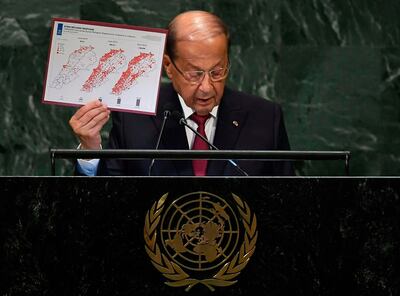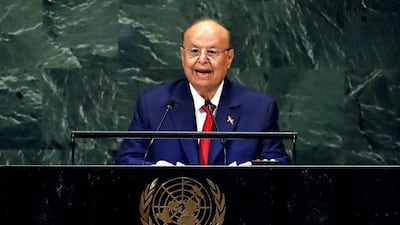Yemeni President Abdrabu Mansur Hadi has called on the international community to pressure Iran to stop meddling in his country and the Arab region as a whole.
Addressing the UN General Assembly for his fourth year in a row, Mr Hadi said Iran and Hezbollah continue to support the rebels and embroil his country in a civil war against the Iran-backed Houthi rebels.
He said that Tehran is providing the Houthis with logistical, military and financial support and has continued to do so throughout the civil war, which broke out in 2015.
“With this in mind, I call on the international community to shoulder its responsibility to bring pressure on Iran so that it stops intervening in Yemen and supporting Houthi militias,” he said.
He added that Iran is trafficking illicit substances into the country in an attempt to create a drug crisis and further weaken the people under its rule. Yemen has suffered for decades with a countrywide problem regarding qat, a highly addictive plant chewed to produce narcosis.
He told the general assembly that the Houthis are increasingly using “gangster tactics” by recruiting children to fight on the frontline and extorting resources from residents to fuel their fight against the Yemeni government.
“Peace can’t be reached by cajoling these gangsters but through implementing the Security Council measures, and the international community must act on that,” he said.
Resolution 2216, which was passed in April 2015, demands the end to violence in Yemen and demands that all sides, in particular the Houthis, unconditionally end violence and refrain from disrupting the political process.
Mr Hadi, whose speech was his fourth General Debate address since 2015, said that his country continues to support the peace efforts by Martin Griffith, the UN special envoy to Yemen.
However, he cast doubt, again, on the willingness of Houthis to come to a political solution, which the internationally-recognised government supports. He said that their track record has proven otherwise, most recently failing to attend peace talks in Geneva earlier this month.
He also made mention of the economic situation in Yemen saying that policies have been put in place but that more needs to be done.
“The economic hardship we experienced during the war, is due to the fact that militias have wasted our reserves, this is truly felt through by citizens,” he said.
He also thanked the Saudi government, who has led an Arab Coalition to intervene on behalf of Mr Hadi in the civil war in Yemen since 2015.
He ended by saying that he will continue to fight to alleviate the humanitarian toll on his country and to aim for peace under a political solution.
“Under the 21st century we can’t accept the rule of mullahs as rule, as the Houthis want us to do. Yemen represents the source of Arab, and it will stand high and proud."

Holding up a graphic showing the increased density of Syrian refugee camps in Lebanon, President Michel Aoun called on the United Nations for assistance in helping the displaced people return home safely.
Mr Aoun lamented the impact Syrian refugees had on the country, saying crime rates and unemployment had increased.
"I reiterate the stance of my country, which seeks to consolidate the right of dignified return, rejecting any project of settlement, whether for displaced or refugees," Mr Aoun said, referring to more than one million refugees settled in Lebanon.
Mr Aoun also launched a strong criticism of the double standards in the way the UN treats the Middle East, pointing to the treatment of Palestine as an example.
In his address to world leaders, Mr Aoun criticised the Trump administration's decision to recognise Jerusalem as the capital of Israel while cutting aid to Palestinians and to the UN agency for Palestinian refugees.
Mr Aoun said "history has taught us that injustice leads to war...Absence of justice can lead to violence and terrorism."
He added, "unfortunately, international political approaches to the Middle East still lack justice and there are double standards in this regard. The Palestinian question is an example of that."
The Lebanese president called for reform and greater transparency of the Security Council, asking for more nations to be included on the council.
"There must be a reform project that sets out to increase the number of member states in the Security Council, and adopt a more transparent, democratic and balanced system," he said.
Calls for reform of the United Nations, like Mr Aoun's, have been frequent at this year's General Assembly.

